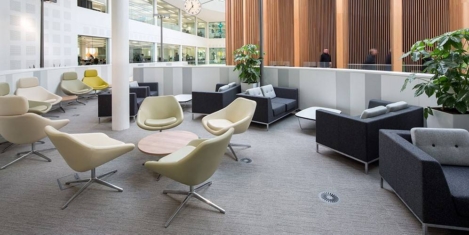December 17, 2021
Search Results for: home working
December 14, 2021
Councils can meet net zero targets with help of building renovation
by Jayne Smith • Environment, News, Property
 The UK Green Building Council (UKGBC), together with the World Green Building Council, several European Green Building Councils, Climate Alliance and the Buildings Performance Institute Europe, has published a framework to support cities and local authorities to measure the impacts and wider benefits of building retrofit as a way of meeting their net zero targets. (more…)
The UK Green Building Council (UKGBC), together with the World Green Building Council, several European Green Building Councils, Climate Alliance and the Buildings Performance Institute Europe, has published a framework to support cities and local authorities to measure the impacts and wider benefits of building retrofit as a way of meeting their net zero targets. (more…)
December 7, 2021
Milliken & Company announces carbon-neutral flooring portfolio
by Freddie Steele • Company news, Flooring
 Global manufacturer Milliken & Company announces a new milestone in its ongoing sustainability journey. All Milliken carpet, luxury vinyl tile and entryway tile products around the globe are now carbon neutral, offsetting carbon emissions in raw materials and manufacturing carbon footprint using Verified Carbon Standard credits. (more…)
Global manufacturer Milliken & Company announces a new milestone in its ongoing sustainability journey. All Milliken carpet, luxury vinyl tile and entryway tile products around the globe are now carbon neutral, offsetting carbon emissions in raw materials and manufacturing carbon footprint using Verified Carbon Standard credits. (more…)
December 2, 2021
UK employees health demands on returning to the workplace
by Jayne Smith • News, Wellbeing, Working lives
 As the new Covid-19 variant, omicron, threatens to spread across the globe, research from Infogrid, claims that people who have not had their Covid-19 vaccination have become a major barrier to employees wanting to return to the physical office. Over half (57 percent) of UK employees who attend or expect to return to the physical workplace said they are worried about encountering people at work who are not vaccinated. (more…)
As the new Covid-19 variant, omicron, threatens to spread across the globe, research from Infogrid, claims that people who have not had their Covid-19 vaccination have become a major barrier to employees wanting to return to the physical office. Over half (57 percent) of UK employees who attend or expect to return to the physical workplace said they are worried about encountering people at work who are not vaccinated. (more…)
November 30, 2021
Pandemic-driven shifts have made the workforce smaller, younger and more female
by Jayne Smith • Flexible working, News, Working lives
 The pandemic has not led to mass unemployment as many feared, but has instead driven wider shifts that have increased employment among younger women, but pushed many men and older workers out of the labour market altogether, according to new research. (more…)
The pandemic has not led to mass unemployment as many feared, but has instead driven wider shifts that have increased employment among younger women, but pushed many men and older workers out of the labour market altogether, according to new research. (more…)
November 30, 2021
The hybrid impact: IT is putting businesses at risk
by Jayne Smith • Business, News, Technology
 New research from IONOS Cloud, has highlighted the biggest security risks businesses are facing when it comes to hybrid working, and views and attitudes on how to ensure organisations stay safe and secure. (more…)
New research from IONOS Cloud, has highlighted the biggest security risks businesses are facing when it comes to hybrid working, and views and attitudes on how to ensure organisations stay safe and secure. (more…)
November 29, 2021
Winds of change are blowing through the office
by Ben Capper • Comment, Wellbeing, Workplace design
 Whilst driving through Zürich in a hailstorm I passed a Mercedes with a plastic bin liner taped over a missing window. Two thoughts struck me. First: this must be the result of the owner locking himself out of the car, as car crime is a fictional event in Switzerland (bike theft is preferred). The second was how utterly pointless this flapping piece of plastic served as an attempt to seal the broken window. (more…)
Whilst driving through Zürich in a hailstorm I passed a Mercedes with a plastic bin liner taped over a missing window. Two thoughts struck me. First: this must be the result of the owner locking himself out of the car, as car crime is a fictional event in Switzerland (bike theft is preferred). The second was how utterly pointless this flapping piece of plastic served as an attempt to seal the broken window. (more…)
November 25, 2021
Confidence sky high in London Office Crane survey
by Jayne Smith • Cities, News
 The London Office Crane Survey Winter 2021 suggests dramatically improved confidence about London in the developments that are being undertaken in the office market. The survey, compiled by Deloitte, claims the volume of new starts has increased from 3.1 million to 3.4 million sq ft, above the long-term average of 2.4 million sq ft. (more…)
The London Office Crane Survey Winter 2021 suggests dramatically improved confidence about London in the developments that are being undertaken in the office market. The survey, compiled by Deloitte, claims the volume of new starts has increased from 3.1 million to 3.4 million sq ft, above the long-term average of 2.4 million sq ft. (more…)
November 25, 2021
Work becoming more secure but more action needed to enforce employment rights
by Jayne Smith • Flexible working, News, Working lives
 A new report ‘Has work become less secure?’ from the CIPD claims that, overall, employment in the UK has actually become more secure on most measures over the last decade – despite the impact of the pandemic. Compared with 2010, there are proportionally fewer people today working variable hours, working part-time involuntarily, or wanting to work more hours. (more…)
A new report ‘Has work become less secure?’ from the CIPD claims that, overall, employment in the UK has actually become more secure on most measures over the last decade – despite the impact of the pandemic. Compared with 2010, there are proportionally fewer people today working variable hours, working part-time involuntarily, or wanting to work more hours. (more…)
November 24, 2021
Brits reluctant to take a sick day during the pandemic
by Jayne Smith • Flexible working, News, Wellbeing, Working lives
November 23, 2021
Facilities Managers provide the key to unlock the future of work
by Neil Franklin • Facilities management, News
 Ricoh UK has published a report called Leading Change at Work: The role of FM in driving the digital workplace (registration), which claims to offer ‘the definitive discussion on the future of work in the UK’. The report follows on from last year’s Conscious Workplace research which set out the behaviours, mindsets and influences shaping the new world of work in a post-pandemic world. After hosting a roundtable with five Facilities Managers from various businesses, Ricoh has gathered insight into the ongoing challenges being faced by organisations. (more…)
Ricoh UK has published a report called Leading Change at Work: The role of FM in driving the digital workplace (registration), which claims to offer ‘the definitive discussion on the future of work in the UK’. The report follows on from last year’s Conscious Workplace research which set out the behaviours, mindsets and influences shaping the new world of work in a post-pandemic world. After hosting a roundtable with five Facilities Managers from various businesses, Ricoh has gathered insight into the ongoing challenges being faced by organisations. (more…)






 More than a third (37 percent) of legal professionals have considered leaving their role due to poor mental health and wellbeing, according to the latest research from
More than a third (37 percent) of legal professionals have considered leaving their role due to poor mental health and wellbeing, according to the latest research from 








 British workers took the seventh lowest number of sick days in Europe last year, according to new
British workers took the seventh lowest number of sick days in Europe last year, according to new 








December 1, 2021
There are thirty-eight ways to win an argument, but this ain’t one
by Mark Eltringham • Comment, Flexible working